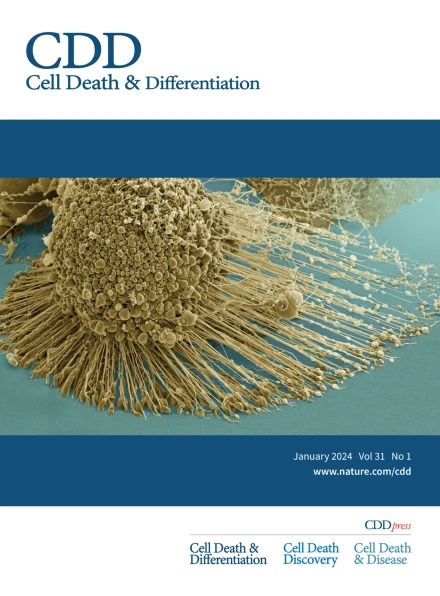Re-appraising assays on permeabilized blood cancer cells testing venetoclax or other BH3 mimetic agents selectively targeting pro-survival BCL2 proteins
IF 15.4
1区 生物学
Q1 BIOCHEMISTRY & MOLECULAR BIOLOGY
引用次数: 0
Abstract
BH3 mimetic drugs that selectively target the pro-survival BCL2 proteins are highly promising for cancer treatment, most notably for treating blood cancers. Venetoclax, which inhibits BCL2, is now approved for treating chronic lymphocytic leukemia (CLL) and acute myeloid leukemia (AML). Preferably, robust and validated assays would identify patients most likely to benefit from therapy with venetoclax itself or with inhibitors of other pro-survival proteins. A sophisticated method that has been developed is the BH3 profiling assay. In this assay, permeabilized, instead of intact, cells are treated for a few hours with inhibitors of the pro-survival BCL2 proteins, and the resultant mitochondrial depolarization measured. Sensitivity to a specific inhibitor (e.g., venetoclax or other BH3 mimetics) is then used to infer the reliance of a tumor (e.g., CLL) on one or more pro-survival BCL2 proteins. However, we found that this methodology cannot reliably identify such dependencies. In part, this is because almost all cells express multiple pro-survival BCL2 proteins that restrain BAX and BAK which must be inhibited before mitochondrial depolarization and apoptosis can proceed. Using genetic and pharmacological tools across multiple cell line models of blood cancer, we demonstrated that selective BCL2 inhibitors have important flow-on effects that includes the redistribution of BH3-only proteins to ancillary pro-survival proteins not directly engaged by the inhibitor. These secondary effects, critical to the biological action of selective inhibitors, were not accurately recapitulated in permeabilized cells, probably due to the limited time frame possible in such assays or the altered biophysical conditions when cells are permeabilized. While we could consistently define the sensitivity of a tumor cell to a particular BH3 mimetic drugs using intact cells, this was not reliable with permeabilized cells. These studies emphasize the need to carefully evaluate assays on permeabilized cells undertaken with inhibitors of the pro-survival BCL2 proteins.


对渗透性血癌细胞进行重新评估,测试venetoclax或其他BH3模拟剂选择性靶向促生存BCL2蛋白
选择性靶向促生存BCL2蛋白的BH3模拟药物在癌症治疗中非常有前景,尤其是在治疗血癌方面。Venetoclax是一种抑制BCL2的药物,目前已被批准用于治疗慢性淋巴细胞白血病(CLL)和急性髓性白血病(AML)。最理想的是,可靠和有效的分析方法将确定最有可能从venetoclax本身或其他促生存蛋白抑制剂治疗中获益的患者。已经开发的一种复杂的方法是BH3分析分析。在这个实验中,渗透性细胞,而不是完整的细胞,用促生存的BCL2蛋白抑制剂处理几个小时,并测量由此产生的线粒体去极化。然后利用对特定抑制剂(如venetoclax或其他BH3模拟物)的敏感性来推断肿瘤(如CLL)对一种或多种促生存BCL2蛋白的依赖。然而,我们发现这种方法不能可靠地识别这样的依赖关系。在某种程度上,这是因为几乎所有细胞都表达多种抑制BAX和BAK的促生存BCL2蛋白,这些蛋白必须在线粒体去极化和凋亡进行之前被抑制。通过对多种血癌细胞系模型使用遗传和药理学工具,我们证明了选择性BCL2抑制剂具有重要的流动效应,包括BH3-only蛋白重新分配到非直接由抑制剂参与的辅助生存蛋白。这些对选择性抑制剂的生物作用至关重要的次生效应,并没有在渗透细胞中得到准确的再现,这可能是由于此类测定的时间框架有限,或者细胞渗透时生物物理条件的改变。虽然我们可以使用完整的细胞一致地确定肿瘤细胞对特定BH3模拟药物的敏感性,但对于渗透性细胞来说,这并不可靠。这些研究强调需要仔细评估使用促生存BCL2蛋白抑制剂进行的渗透细胞试验。
本文章由计算机程序翻译,如有差异,请以英文原文为准。
求助全文
约1分钟内获得全文
求助全文
来源期刊

Cell Death and Differentiation
生物-生化与分子生物学
CiteScore
24.70
自引率
1.60%
发文量
181
审稿时长
3 months
期刊介绍:
Mission, vision and values of Cell Death & Differentiation:
To devote itself to scientific excellence in the field of cell biology, molecular biology, and biochemistry of cell death and disease.
To provide a unified forum for scientists and clinical researchers
It is committed to the rapid publication of high quality original papers relating to these subjects, together with topical, usually solicited, reviews, meeting reports, editorial correspondence and occasional commentaries on controversial and scientifically informative issues.
 求助内容:
求助内容: 应助结果提醒方式:
应助结果提醒方式:


